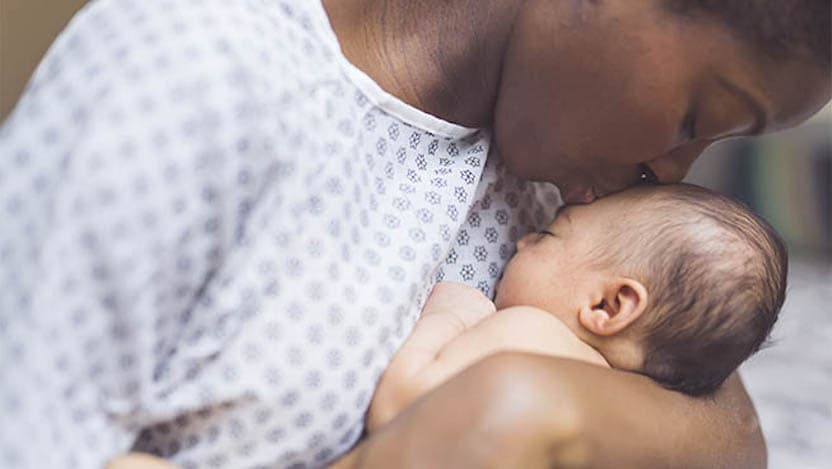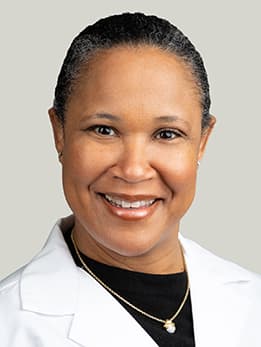Ingalls Memorial programs work to improve Black maternal health in south suburbs

Black mothers need better access to quality healthcare, but also important in addressing the Black maternal health disparities in Chicago's south suburbs is building trust, said Shanice Williams, Healthy Baby Network Coordinator at UChicago Medicine Ingalls Memorial Hospital in Harvey, Illinois.
Mothers and mothers-to-be need physicians who acknowledge their needs, fears and concerns, she said. During one of the most important times of their lives, they also need access to resources that can support a healthy pregnancy and baby.
“I think one of the benefits that we have here at Ingalls is that we have physicians that look like the population that we serve,” Williams said. “That creates the opportunity to have trust.”
In this country, Black women are three to four times more likely to die from pregnancy-related causes than white women. Black patients are also 2.1 times more likely to experience severe maternal morbidity and 1.5 times more likely to have a preterm delivery when compared to white women, UChicago Medicine’s Jana J. Richards, MD, wrote in a story focused on racial justice and Black maternal health.
Increasing access to maternal healthcare is one of the health priorities identified in Ingalls’ Community Health Needs Assessment (CHNA). Ingalls is focused on providing mothers with education, resources and treatment to increase access to care while improving social determinants of health.
The latest data available as part of the CHNA shows that 18.7% of people living in the communities Ingalls serves live below the federal poverty line, 12.8% are food insecure, 9.9% do not have insurance, and 31.3% have Medicaid coverage. Also, the assessment notes, when children are born in the Ingalls service area, they are more than twice as likely to live in a single-parent household compared to Cook County and Illinois.
Williams, who is a Black mother of two children, understands that Black moms face barriers to healthcare access.
“I'll hear patients say, ‘I was just scared to come to the hospital because I didn't have medical insurance.’ Or, ‘Now I have medical insurance, but I don't know where to go because they told me if I go outside of this coverage area, I may have a bill, and I don't have the money to pay that.’ A lot of patients are trying to determine how they're going to put food on their tables,” she said.
How is Ingalls helping moms?
Ingalls’ Healthy Baby Network (HBN) was created in 2006 to help mothers in the south suburbs connect with physicians. It has grown to do so much more. Williams, who has led the program since 2008, said the free program now helps with transportation, insurance and resources that bring prenatal care and access to care right to the patient, all done with the intention to make Black moms feel safe and valued.
As soon as the patient is identified at Labor and Delivery, often through triage, Williams is at their bedside trying to establish future care or connect them to needed resources, whether it is transportation, food insecurity or not knowing where to get additional help.
“A lot of times, the patients have the resources, but they just don't know how to connect the dots. So we're here to connect those dots,” she said.
Last year, 109 women accessed prenatal care at Ingalls, with 88 full-term deliveries, 96% of whom were helped by the HBN. In addition, 86 babies were born with normal birth weights, 93% of whom were helped by the HBN.
Williams said she has re-established back in-person on-site education that was interrupted by the pandemic. Most recently, Ingalls has hosted breastfeeding, infant care and childbirth preparation classes. Soon to come is a class on maternal mental health. Plus, the popular annual Healthy Baby Network Drive Thru Baby Shower is set for September to provide resources and baby necessities.
“I am a strong believer in the more education we give our patients, the better equipped they will be coming through our doors, and then they can better help themselves,” Williams said.
What can Ingalls offer moms?
With recent closings of OB units in the south suburbs, only Ingalls Memorial and St. James Olympia Fields remain as local options for birthing sites. She called Ingalls’ Family Birth Center “a little hidden gem.”
Moms-to-be need to know they have quality care right in their backyard, Williams said. Too often patients think they have to travel to have their babies.
“More so than anything, with those high-risk emergency patients, they're either making it to Ingalls at just the nick of time or not making it, which can also possibly increase those rates that we're seeing with maternal mortality as well as infant mortality,” she said.
Ingalls’ Family Birth Center and HBN follow up with moms at discharge to make sure they receive their aftercare appointments and to check on any needs for additional resources. One big focus is on maternal hypertension. Moms with hypertension or who have a previous diagnosis of preeclampsia receive a wristband to wear three weeks postpartum so that should they be readmitted or seek care elsewhere, they have a tool they can use to advocate for themselves rather than having to start from square one any time they seek care, she said.
“I'm brought to tears," Williams said. "It's such a sense of fulfillment because to me, it's helping two lives, it's mom as well as baby, not to mention who else is in the household. We know that women lead the way for our healthcare decisions. We are now opening the door and exposing that mom to what quality healthcare looks like, not just for her and her baby, but for her entire family.”
“I truly think this is my calling,” Williams added. “Until I feel like I've made my mark and our community knows that Ingalls is a valuable resource for their maternal care, I still have work to do.”
For more information about the Healthy Baby Network, call 708-915-3825.

Jana J. Richards, MD
Jana J. Richards, MD, provides expert obstetric and gynecologic care, including annual exams, preventive care, prenatal care and more. She works with her patients to diagnose a wide range of conditions, such as abnormal uterine bleeding, uterine fibroids and abnormal pap smears.
Learn more about Dr. Richards